Hungarian Prime Minister Viktor Orban, who is blocking a European financial aid package of 50 billion euros over four years for Ukraine, has explicitly requested that this aid be granted outside the EU budget and be subject to annual review.
Strong Opposition
“If we want to support Ukraine, let’s do it outside the EU budget and on an annual basis! This is the only sustainable democratic position with five months to go before the European elections,” Orban mentioned in a post on the social network X. He clarified his position after stating on Tuesday that he was willing to support Kiev but “without harming the EU’s common budget.” The Hungarian Prime Minister gave up his veto on Ukraine’s accession negotiations with the EU in December at the European Council. However, he blocked a €50 billion EU financial aid package for Ukraine for the next four years. This decision was made amidst tensions between Budapest and Kiev regarding the rights of the Hungarian minority in the Transcarpathia region and the European Commission’s withholding of EU funds that Hungary is entitled to. The Hungarian government has been accused by Brussels of violating the rule of law. Before the December summit, the European Commission unlocked €10.2 billion from cohesion funds for Hungary, along with €920 million from the European REPowerEU plan. However, over €21 billion of other EU funds (cohesion funds and post-pandemic recovery plan) remain frozen.
During this time, Viktor Orban is demanding the unblocking of all European funds, which he claims have been unfairly withheld from his country for political reasons by the European Commission due to Hungary’s opposition to illegal migration and the LGBT movement.
While discussions with Budapest continue regarding the lifting of the veto on aid to Ukraine ahead of a new European summit scheduled for February 1st, the European Commission is exploring alternative solutions, such as taking out a €20 billion loan and providing this amount to Ukraine. Hungary opposes this loan scheme as well, which is similar to the financing of the European post-pandemic recovery plan, warning that ultimately, all EU member states will have to repay this credit through their own contributions to the EU budget.
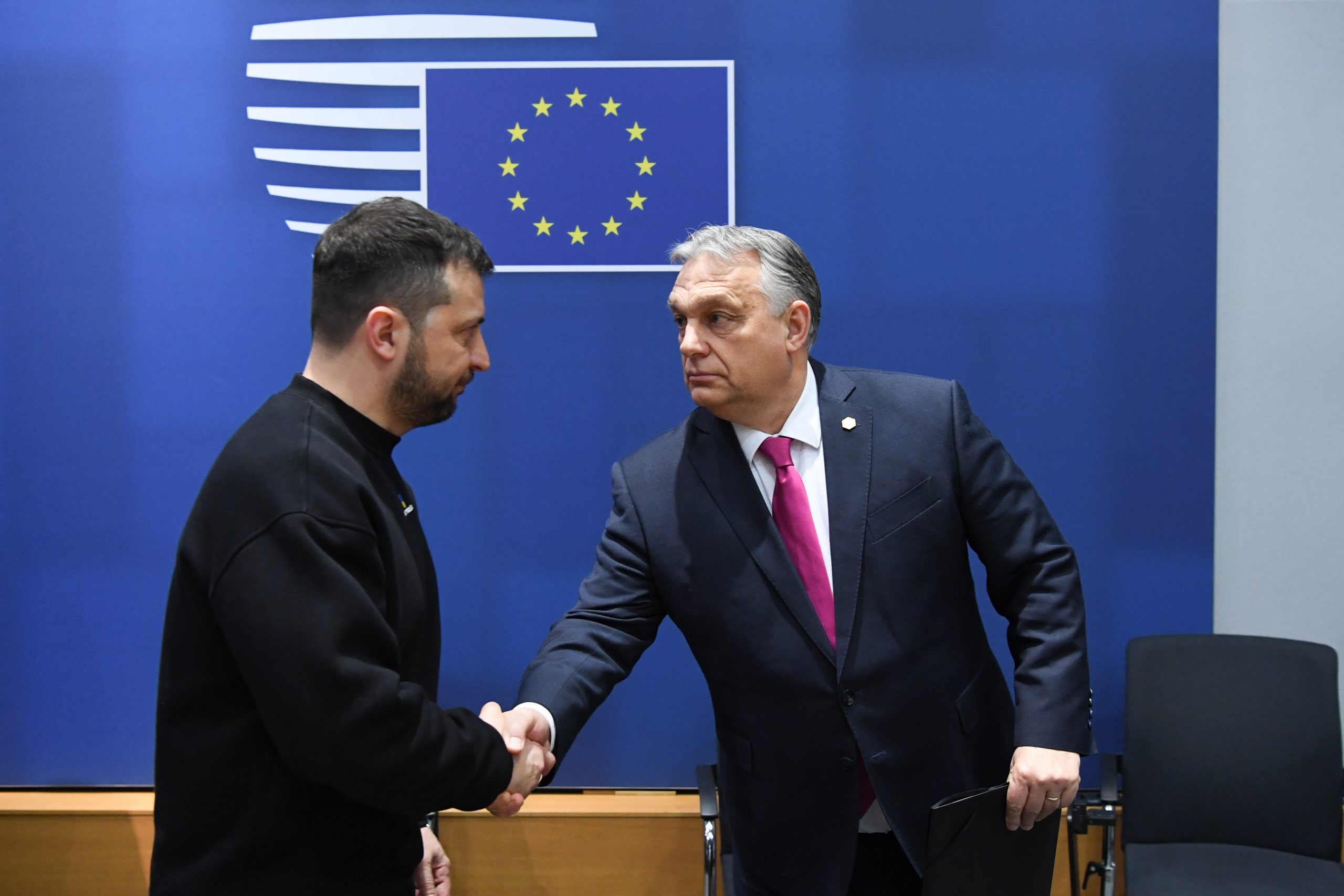
Is the EU blackmailed?
Hungary is far from reaching an agreement with the European Union regarding aid for Ukraine, according to Gergely Gulyas, the chief of staff to Hungarian Prime Minister Viktor Orban. This statement comes as the EU seeks to secure a deal on a new financial assistance package for Kiev, as reported by Reuters.
Gergely Gulyas made these remarks after European Commission President Ursula von der Leyen stated during a session at the European Parliament in Strasbourg that she was “confident” that all 27 EU member states would find a solution to provide funds to Ukraine, a matter currently hindered by Hungary’s resistance.
Hungary is in discussions with the Commission, but it is not certain that an agreement will be reached. If an agreement is not reached, the other 26 EU member states may find a solution without Hungary, said Orban’s chief of staff.
Providing aid through 26 bilateral agreements is an option that has been brought up but is more complicated and costly than using the central budget, and it could potentially affect EU unity.
Gergely Gulyas also explained that the President of the European Commission has conditioned the unlocking of new EU funds for Hungary on changes related to LGBTI issues and migration, attempting to exert pressure on Budapest.
He emphasized that Hungarian voters have clearly expressed their opinions on these two issues and assured that his government is willing to reach an agreement on matters that are “not harmful.” However, when it comes to issues on which Hungarian citizens have made their stance clear, this would be “antidemocratic and unacceptable,” the source further emphasizes.
Historical Relations
In the past, Hungary and Russia had historical ties, especially in the 19th century when both countries were part of the Habsburg Empire and shared political and cultural connections. However, these relations became tense after the Cold War when Hungary moved out of the sphere of influence of the Soviet Union.
Hungary and Russia have a significant trade relationship. Hungary imports energy, especially natural gas, from Russia and has been a supporter of the construction of the Nord Stream 2 gas pipeline, which would enable the direct supply of Russian gas to Western Europe. This has been criticized by some European countries and the United States, who believe it could increase Western Europe’s dependence on Russian energy resources.
Hungary and Russia have cooperated in the field of nuclear energy for civilian purposes. Hungary operates a nuclear power plant, the Paks Nuclear Power Plant, which has four nuclear reactors and plays a crucial role in the country’s electricity production. This plant was built in collaboration with Russia and was modernized through an agreement signed in 2014, which included the construction of two new reactors at Paks.
This nuclear cooperation has been of interest in the context of European energy and geopolitical security. Some Western countries and organizations have expressed concerns about Hungary’s dependency on Russia in terms of nuclear energy, viewing it as a potential influence of Russia in the energy infrastructure of Eastern Europe.
Hungary is a member of the European Union (EU) and is subject to EU policies and regulations. Within the EU, Hungary has previously opposed the sanctions imposed on Russia following the annexation of Crimea in 2014. This stance has drawn criticism from other EU member states that have supported the sanctions.
The relationship between Budapest and Moscow is complex and ever-changing, influenced by multiple economic, energy, and geopolitical interests and considerations. This relationship can evolve based on changes in the domestic and international policies of both countries.
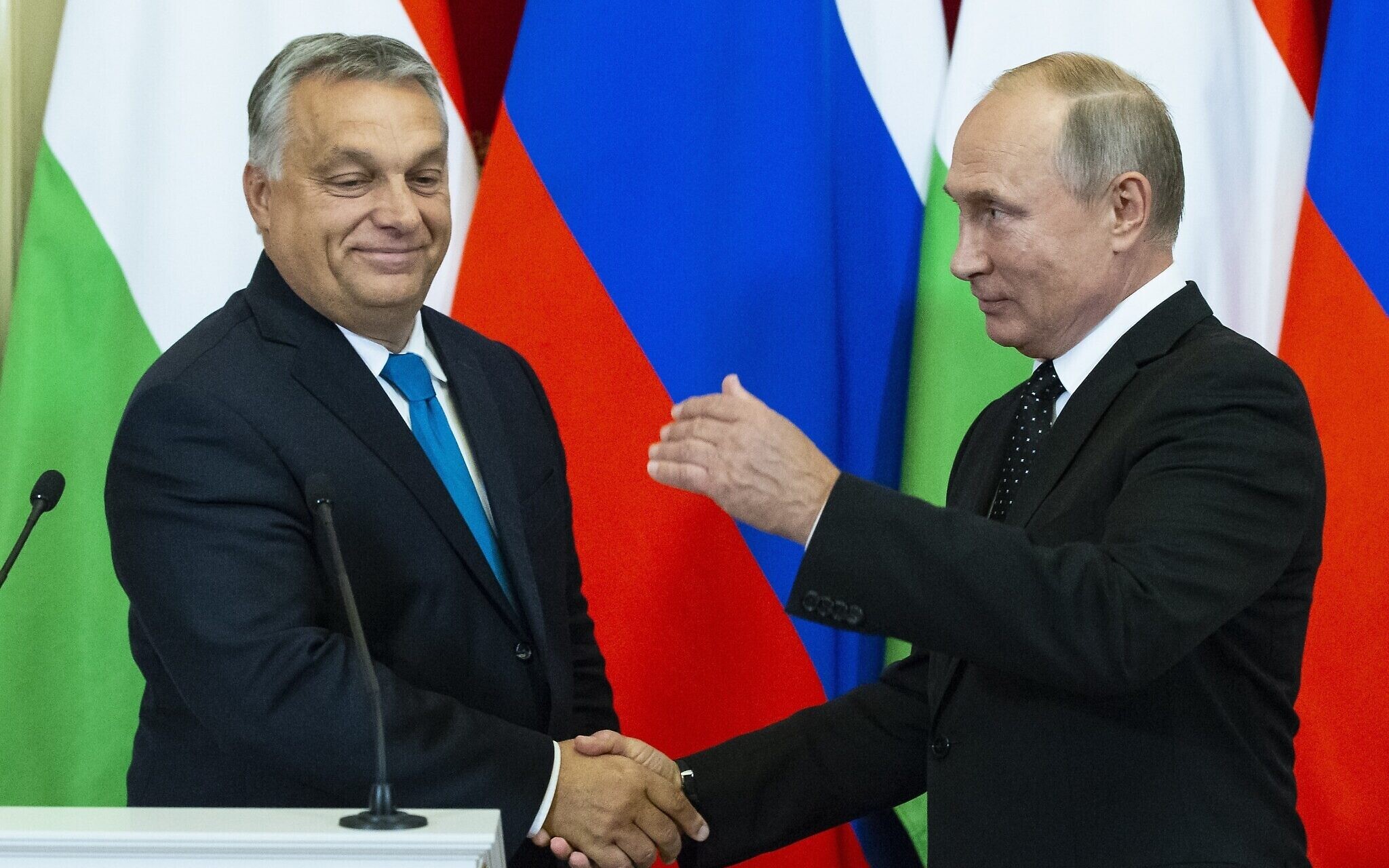
Budapest and Kiev
The relations between Ukraine and Hungary have been tense at various points in recent history due to various issues, especially those related to the Hungarian minority in Ukraine and the bilateral relations between the two countries.
One of the main sources of tension between the two countries is the Hungarian minority in Ukraine, which resides mainly in the Transcarpathia (Zakarpattia) region in western Ukraine. Hungary has periodically raised concerns regarding the rights and status of this minority, including issues related to the use of the Hungarian language in schools and local administration. Russian propaganda has exploited these differences to the fullest, with accusations of the involvement of Russian federal security services in various destabilization actions.
A major source of tension was Ukraine’s adoption of an education law in 2017, which raised concerns in Hungary. The law restricted the use of minority languages in schools and imposed limits on the use of the Hungarian language in the education system. Hungary saw this law as a threat to the rights of the Hungarian minority in Ukraine.
Tensions related to minority issues have led to diplomatic conflicts between the two countries. Hungary has blocked or put on hold certain Ukrainian initiatives within the European Union and NATO in response to these concerns.
The relations between Ukraine and Hungary should be understood in the broader geopolitical context of Eastern Europe and Ukraine’s relations with other neighboring states, such as Russia and Romania. The current leadership in Budapest has used the issue of minorities in relations with all neighboring states, raising accusations of serving the strategic interests of Hungary within the broader context of Moscow’s strategy to weaken the European Union and NATO from within.
German Warning
German Defense Minister Boris Pistorius has warned that the war between Russia and Ukraine could extend to neighboring countries, as reported by the media. “We hear threats from the Kremlin almost every day – most recently again against our friends in the Baltic states,” Pistorius said in an article published by the Tagesspiegel newspaper on Friday, marking exactly one year since taking office as the Federal Minister of Defense. Regarding the German army (Bundeswehr), Boris Pistorius emphasized: “We need to rapidly strengthen our defense capabilities, in the context of the urgency of the threat situation.” “Therefore, we must consider the fact that (Russian President) Vladimir Putin might even attack a NATO country at some point,” Boris Pistorius stated, estimating that if it were to happen, it would be within “5-8 years” from now. With his call for the Bundeswehr to become “war-ready,” Pistorius intended to “shake up” German society. He is waiting for proposals to reintroduce a version of mandatory military service by April, after his country abandoned it in 2011. According to the German minister, the defense industry needs to become more efficient. Boris Pistorius has advocated for reforming public debt, for security reasons. “With a debt mechanism in its current form, we will not get through these crises unscathed,” he explained. On the other hand, the Berlin representative rejected requests for increasing German military aid to Ukraine, saying that the Bundeswehr cannot be brought to “exhaustion” and leave Germany “defenseless.” On February 24, 2022, Russia launched an unjustified and unprovoked aggression against Ukraine, claiming to carry out a “special military operation of denazification” in the neighboring country and to protect the Russian-speaking community.
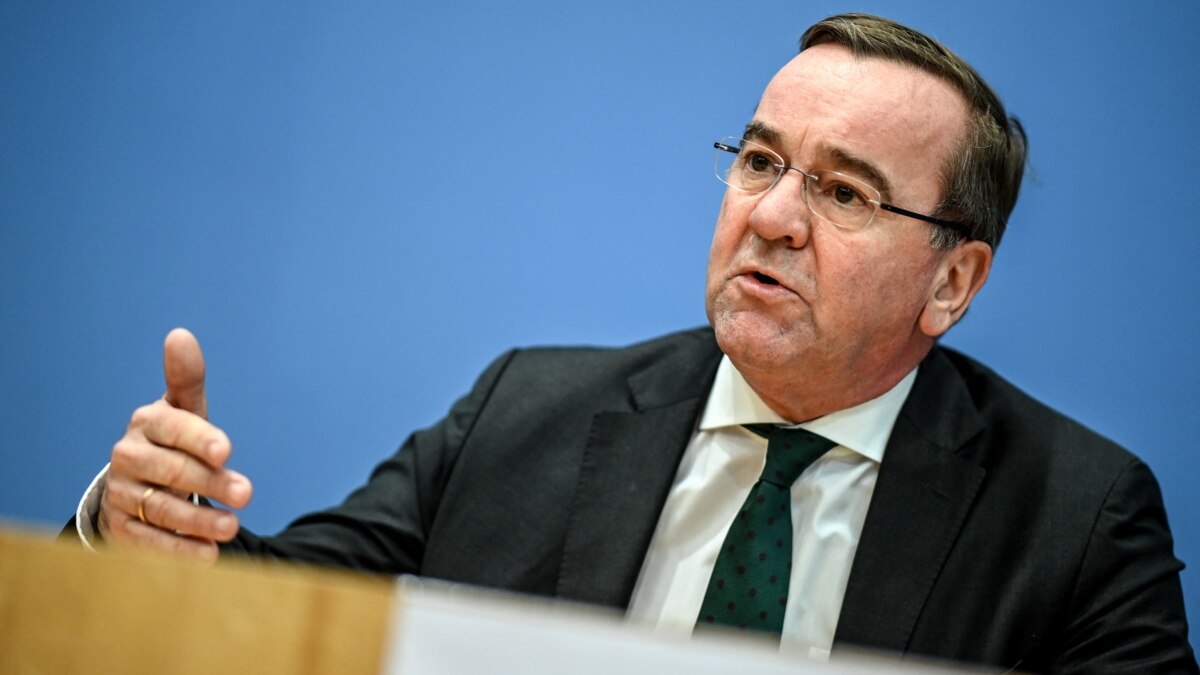
Parliamentary Protest
The European Parliament has contested the European Commission’s decision to unfreeze over 10 billion euros in EU funds for Hungary last December, in a resolution voted on Thursday, two weeks before an extraordinary European Council summit dedicated to adopting aid for Ukraine, as reported by Agerpres in a special correspondence. In the resolution adopted with 345 votes in favor, 104 against, and 29 abstentions, MEPs express their deep concern about the ongoing erosion of democracy, rule of law, and fundamental rights in Hungary, particularly with the recent adoption of the so-called “national sovereignty protection package” – which has been compared to Russia’s “foreign agents law,” as stated by the community legislature in a press release. Expressing regret for the Council’s failure to apply the procedure provided for in Article 7, Paragraph (1), following its activation by the Parliament in 2018, the community legislature calls on the European Council to determine whether Hungary has seriously and persistently violated EU values, in accordance with the more direct procedure provided for in Article 7, Paragraph (2). In theory, the procedure can lead to the suspension of voting rights at Council of the EU meetings. MEPs also condemn the actions of Prime Minister Viktor Orban, who last December blocked the crucial decision to revise the EU’s long-term budget, including the aid package for Ukraine, thereby fully violating the EU’s strategic interests and the principle of loyal cooperation. The EU must not yield to blackmail, they emphasize in the adopted resolution.
The EP announces its regret over the European Commission’s decision to release up to 10.2 billion from previously frozen funds, despite Hungary not having fulfilled the required reforms for judicial independence, and in a context where the EU executive recently extended the application of measures from the Rule of Law Conditionality Regulation. Furthermore, MEPs condemn systemic discriminatory practices against the academic environment, journalists, political parties, and civil society in the allocation of funds. They also express regret for the use of manipulated public procurement procedures, government and government-affiliated entities’ public purchase offers, and the use of EU funds to enrich the government’s political allies. The necessary measures for unlocking EU funding, under various regulations, should be treated as a single package, and payments should not be made if deficiencies persist in any area. The European Parliament insists that it will examine whether legal action should be initiated to annul the partial unfreezing of funds and emphasizes that it can use a range of legal and political measures if the Commission fails to fulfill its duties as guardian of the treaties and to protect the EU’s financial interests. In the EP plenary session in Strasbourg, Commission President Ursula von der Leyen justified her decision on Wednesday to unfreeze certain funds for Hungary, explaining that Budapest had carried out the reforms demanded by Brussels to strengthen the independence of its judicial system.
However, she reminded that “about 20 billion euros” of EU funds destined for Hungary remain frozen, due to concerns especially related to LGBT+ rights, academic freedom, and the right to asylum.
The EP, in its adopted resolution, also questions whether the Hungarian government will be able to fulfill its duties in the second half of 2024, warning that if the position of President of the European Council is vacant, it will fall to the Hungarian Prime Minister during the Council’s six-month presidency. The text refers to Charles Michel’s announced candidacy in the European parliamentary elections, who announced that he will submit his resignation upon the formation of the new community legislature if elected. MEPs call on the Council to find adequate solutions to mitigate these risks and demand reforms to the Council’s decision.
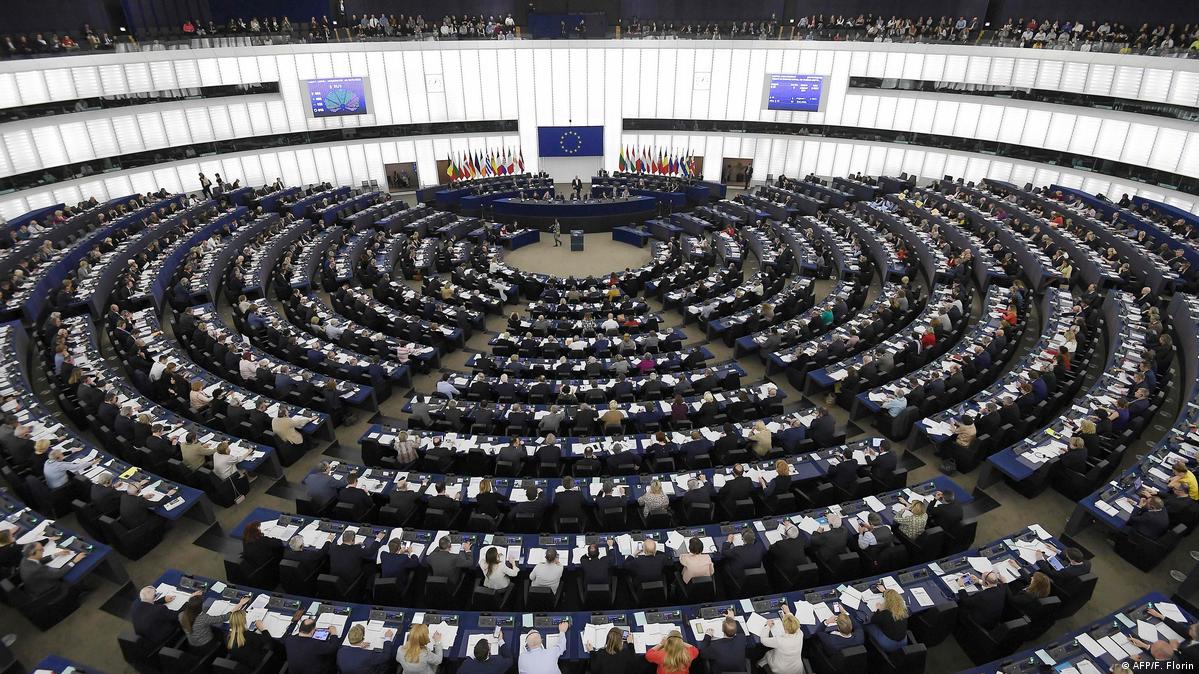
Nuclear Discussions Impossible
Russia has stated that talks with the USA on nuclear arms control are impossible if the situation in Ukraine is not considered, while also accusing Washington of trying to impose its military dominance, according to the media.
Russian Foreign Minister, Sergey Lavrov, explained in a press conference that Washington has proposed separating the two issues and resuming talks on “strategic stability” between the two countries, which hold the world’s largest nuclear arsenals. Lavrov emphasized that this proposal is unacceptable for Russia due to the West’s support for Ukraine in the war that has already lasted for nearly two years.
He made these remarks in the context where the New Start treaty, the last bilateral Russian-American agreement on nuclear arms control, expires in February 2026, and tensions between the two nuclear superpowers are at their highest level since the Cuban Missile Crisis of 1962. “We see not the slightest interest from the USA or NATO in settling the Ukrainian conflict and listening to Russia’s concerns,” added the head of Russian diplomacy, as quoted by the Russian media.
He accused the West of pushing Ukraine to use increasingly long-range weapons to strike deeper inside Russia. Such attacks have intensified in recent weeks; on December 30, 25 people were killed in the southern Russian city of Belgorod in one such attack. Sergey Lavrov provided no evidence to support his claim that the West encourages Ukraine to carry out such attacks but accused the United States of seeking military superiority over Russia, as noted by Reuters.
The Russian minister insisted that talks on arms control are unfounded as long as the West conducts what he called a “hybrid war” against Moscow. “We do not reject this idea in the future, but we condition this possibility on the West abandoning its policy of undermining and disrespecting Russia’s interests,” concluded Lavrov.
The Russian Federation, the inheritor of the Soviet nuclear power, has the world’s largest arsenal of nuclear weapons, nearly 6,000 warheads, according to experts. Together, the USA and Russia hold about 90% of the global nuclear warhead count, enough to destroy the planet several times over.
The Russian foreign minister also called on the USA to cease its “aggression” against Yemen, following the American military’s fourth bombing of Houthi rebels in less than a week. “The most important thing now is to end the aggression against Yemen, as the more the Americans and the British bomb, the less willing the rebels will be to negotiate,” Lavrov noted in the same press conference.
Purification of Russia
Russian Foreign Minister Sergey Lavrov stated on Thursday that the military offensive against Ukraine has allowed for the “purification” of Russia from people who “do not feel a sense of belonging to the history and culture” of the country.
Since the beginning of the conflict nearly two years ago, hundreds of thousands of people have fled the country for political reasons or fear of being drafted into the military, a choice firmly condemned by Russian authorities. The suppression of any dissenting voice has sent hundreds more to prison, as any criticism of the Kremlin’s policies is not tolerated in Russia, according to international media.
“The special military operation has united our society like never before and contributed to its purification from those without any sense of belonging to Russian history and culture,” said Sergey Lavrov, using the official euphemism to refer to the Russian invasion of Ukraine. “Some have left, others have stayed and started to reflect,” he added during a press conference in Moscow, where he reviewed the activities of Russian diplomacy in 2023.
This is not the first time Russian authorities, who claim they want to “denazify Ukraine,” have spoken about the need to “purify” society. In March 2022, at the beginning of the conflict, President Vladimir Putin said that “such an autopurification of society will only strengthen our country.” “Every people, and the Russian people in particular, will always be able to identify the trash and traitors and spit them out as one would spit out a fly that flew into their mouth,” Putin stated.
In the same press conference, the Russian Foreign Minister equated the Holocaust – the genocide against the Jewish people carried out by Nazi Germany during World War II – with the killing of other peoples by the Nazis, as reported on its website by Radio Svoboda, the Russian service of Radio Free Europe (RFE/RL).
Lavrov implied this while commenting on Israel’s operation against the Palestinian Islamist group Hamas, recognized as a terrorist organization by the USA and EU, in the Gaza Strip. According to the Russian minister, “Israelis should not create the impression that, because they suffered during World War II, they can do anything today,” as reported by the radio station. “Yes, there was the Holocaust, a terrible crime. But there was also genocide against all the peoples of the Soviet Union. They did not suffer less… If we were to follow this logic, then we too can do anything, everything is allowed for us,” Lavrov stated in his press conference.
In this context, the head of Russian diplomacy stated that, during Russia’s “special military operation” in Ukraine, “far fewer” civilian casualties are observed compared to the current operation by Israel in the Gaza Strip, according to the Russian official news agency RIA Novosti. Moscow criticizes Israel, accusing it of causing a high number of civilian casualties in the Gaza Strip. In 2022, Israel protested against a statement by Sergey Lavrov, who claimed that Adolf Hitler had “Jewish blood,” and in 2023, when he compared the West’s policy towards Russia with Hitler’s actions against the Jews, according to Radio Svoboda.
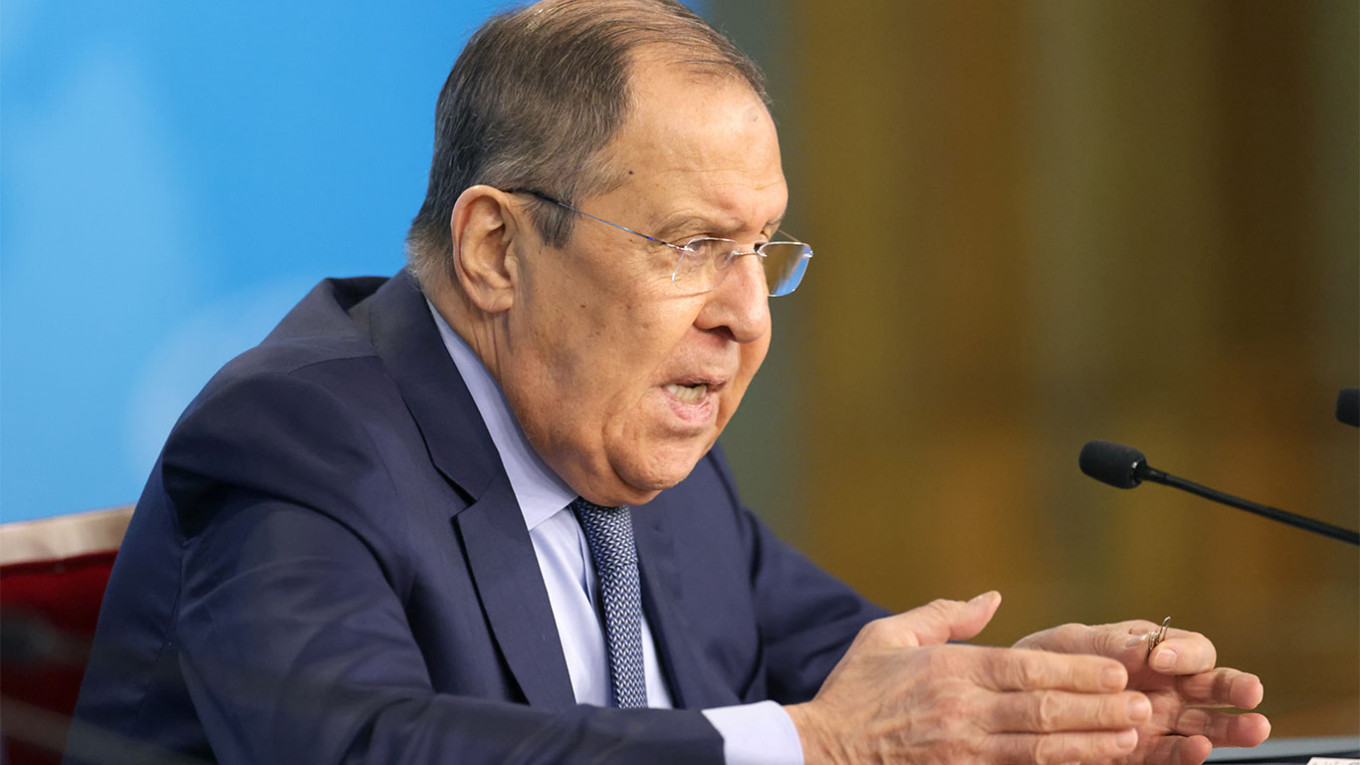
Coalition for Artillery
Allies of Ukraine launched an “artillery” coalition in Paris on Thursday to address urgent weapon needs of Kyiv, which has warned of an “ammunition shortage” ahead of the two-year anniversary of the Russian invasion of Ukraine, international media reports.
“The ammunition shortage is a very real and pressing issue our armed forces are currently facing,” wrote Ukrainian Defense Minister Rustam Umerov on social network X (formerly Twitter) during the launch of an “artillery coalition,” led by France and the USA.
“We need to strengthen Ukrainian defense capabilities to protect the free world against the Russian threat,” he stated.
The artillery coalition launched on Thursday is one of the components of the Ukraine Defense Contact Group, the so-called Ramstein Group, which brings together over 50 countries in several subgroups, from demining to anti-air defense.
“There is no alternative to modern artillery; we must continue our efforts and increase our ammunition production,” the Ukrainian defense minister said in a video conference during the opening ceremony, after canceling his visit for “security reasons”.
France announced on this occasion that it would “release a sum of 50 million euros” to “purchase 12 additional Caesar (howitzers)” – bringing the total number of such equipment for Ukraine to 67 – and said it has the capacity to produce another 60, funding of which will depend on allies.
“I called Emmanuel Macron to thank France for launching the ‘artillery’ coalition for Ukraine and committing to produce dozens of ‘Caesars’,” said President Volodymyr Zelensky on social network X. The two leaders also discussed the “need to further strengthen Ukraine’s anti-air defense,” targeted almost every night by drones and missiles launched by Moscow, added Zelensky.
Kyiv has already deployed 49 Caesars, produced by Nexter (Franco-German group KNDS), with another six howitzers to be delivered “in the coming weeks,” according to the French Ministry of Defense. France has the capacity to produce another 72 such howitzers and is prepared to finance the manufacture of 12, indicated French Defense Minister Sebastien Lecornu. “Thus, 60 remain to be financed, about 250 million euros, a sum that seems accessible for different budgets of the allies,” he continued in front of representatives of 23 countries supporting Ukraine’s defense.
To arm the howitzers, the EU had set a goal to supply Ukraine with a million munitions by spring 2024. But only 300,000 shells have been delivered so far, according to European parliamentarians. Ukrainians launch between 5,000 and 8,000 shells daily, compared to 10,000-15,000 by the Russian side, emphasized Cedric Perrin, chairman of the French Senate’s International Affairs Committee, noting that “national and European production is extremely weak” and that “the current economy does not meet Ukrainian expectations.” From the French side, Minister Lecornu insisted on Thursday on tripling French ammunition deliveries to Ukraine, which have increased from 1,000 units per month to 2,000 in the first year of war and should rise to 3,000 shells starting in January. “We are in the process of rebuilding gunpowder stocks. We are recycling powders from unused ammunition,” he told reporters. The minister also announced the delivery of about 50 air-to-ground guidance kits A2SM per month starting in January, throughout the year. With a medium range, these can be adapted to “Soviet-class” aircraft such as Mig and Sukhoi, used by Ukraine, he assured.
France has already transferred or sold 30 Caesars to Ukraine, which ordered an additional six howitzers in the fall. Denmark has also provided 19 units of an eight-wheeled armored version. Mounted on a truck, the Caesar howitzer can fire 155 mm shells at a distance of 40 kilometers. Emmanuel Macron announced he will visit Ukraine in February, for the second time since the war began on February 24, 2022. France is “about to finalize” a security agreement with Kyiv similar to the one signed on Friday between the United Kingdom and Ukraine for a duration of ten years, he added, announcing among other things the delivery of about 40 Scalp missiles.
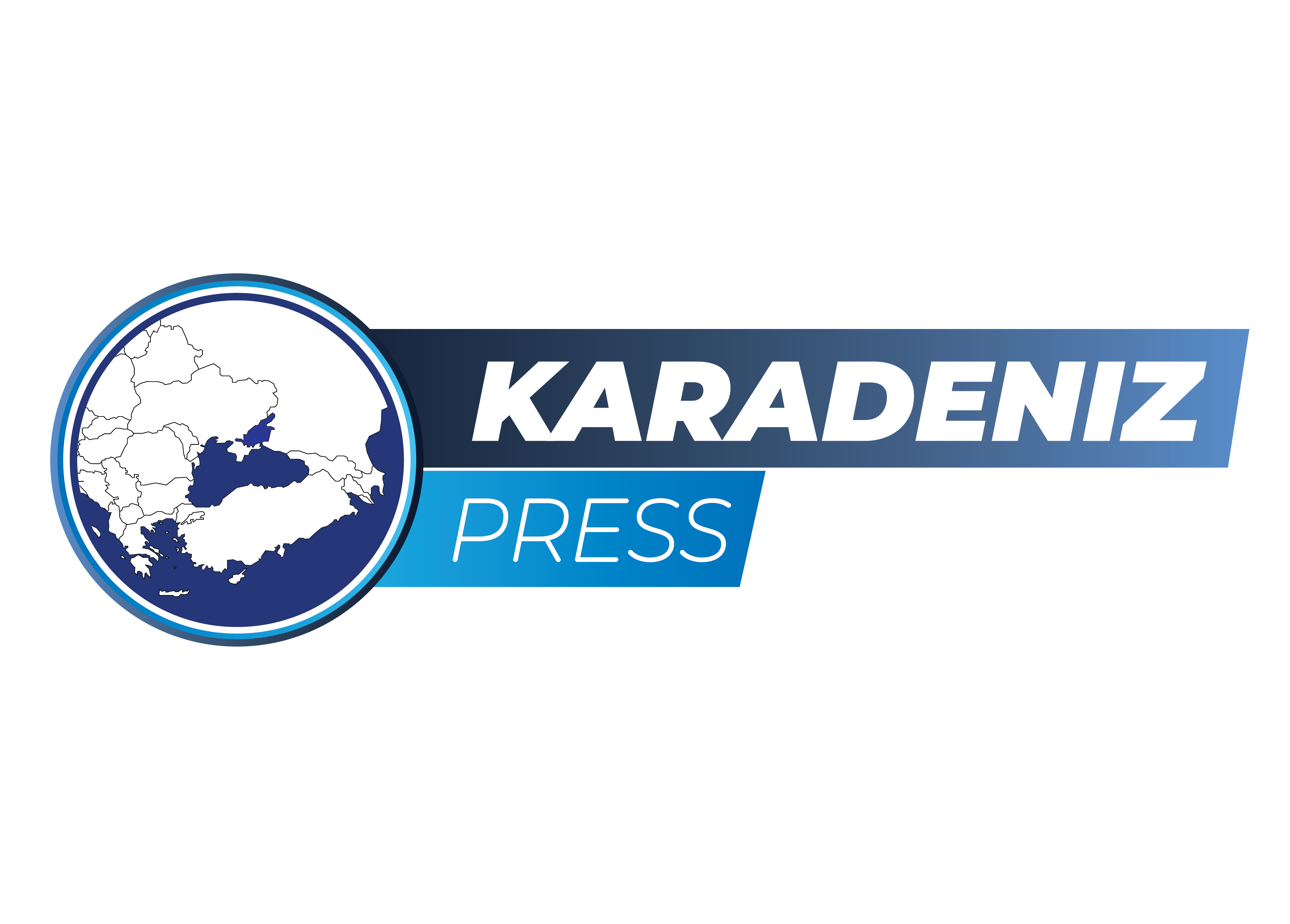

0 Comments